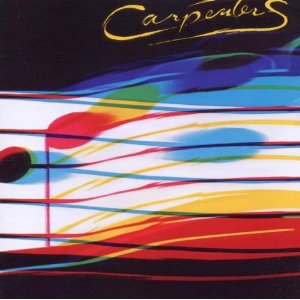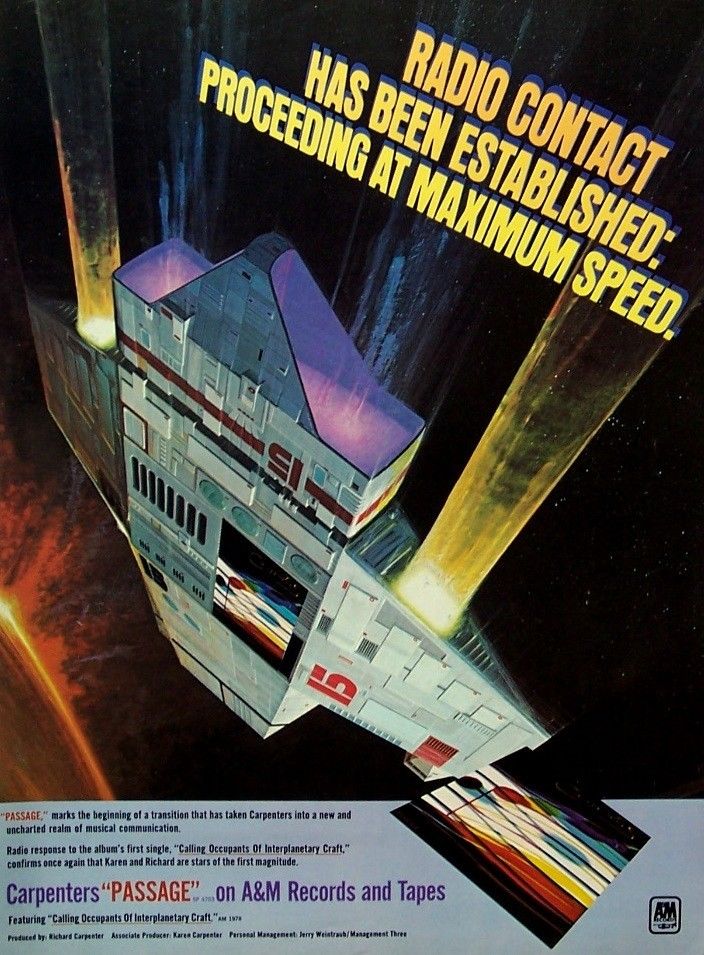Date of Release: 09/23/77
Chart Position- U.S.: #49; U.K.: #12; JAPAN: #7
Album Singles: “All You Get From Love Is A Love Song”/”I Have You”
“Calling Occupants Of Interplanetary Craft”/”Can’t Smile Without You”
“Sweet, Sweet Smile”/”I Have You”
Medium: Reel/Vinyl/8-track/Cassette/CD
Track Listing:
1. B’Wana She No Home 5:29 (Franks)
2. All You Get From Love Is A Love Song 3:46 (Eaton)
3. I Just Fall In Love Again 4:02 (Dorff/Herbstritt/Sklerov/Lloyd)
4. On The Balcony Of The Casa Rosada/Don’t Cry For Me Argentina 7:57 (Webber/Rice)
5. Sweet, Sweet Smile 3:00 (Newton/Young)
6. Two Sides 3:27 (Davis)
7. Man Smart, Woman Smarter 4:21 (Span)
8. Calling Occupants Of Interplanetary Craft 7:07 (Klaatu)
Album Credits:
B’Wana She No Home:
Piano: Pete Jolly
Electric Piano: Larry Muhoberac
Bass: Joe Osborn
Drums: Ron Tutt
Percussion: Wally Snow & Tommy Vig
Conga: Jerry Steinholtz
Electric Guitar: Tony Peluso
Tenor Sax & Alto Flute: Tom Scott
Vocal Arrangement: Gene Puerling
All You Get From Love Is A Love Song:
Electric & Acoustic Piano: Richard Carpenter
Bass: Joe Osborn
Drums: Ed Green
Electric Guitar: Tony Peluso & Ray Parker
Conga: Tommy Vig
Percussion: Jerry Steinholtz
Tenor Sax: Tom Scott
Background singers: Karen & Richard Carpenter, Julia Tillman, Carlena Williams, Maxine Willard
I Just Fall In Love Again:
Electric & Acoustic Piano: Richard Carpenter
Electric Guitar: Tony Peluso
Bass: Joe Osborn
Drums: Ron Tutt
Oboe: Earl Dumler
Harp: Gale Levant
Overbudget Philharmonic: Peter Knight, Conductor
Gregg Smith Singers: Gregg Smith, Conductor
On The Balcony Of The Casa Rosada/Don’t Cry For Me Argentina (From the opera Evita):
Overbudget Philharmonic: Peter Knight, Conductor
Gregg Smith Singers: Gregg Smith, Conductor
Announcer: Dennis Heath
Peron: William Feuerstein
Che: Jonathan Marks
Sweet, Sweet Smile:
Bass: Joe Osborn
Fiddle: Bobby Bruce
Banjo: Larry McNealy
Drums: Ron Tutt
Tack Piano: Tom Hensley
Acoustic & Electric Guitar: Tony Peluso
Two Sides:
Electric Piano: Richard Carpenter
Bass: Joe Osborn
Drums: Ed Green
Acoustic Guitar: Lee Ritenour & Jay Graydon
Electric Guitar: Tony Peluso
Pedal Steel Guitar: Jay Dee Maness
Man Smart, Woman Smarter:
Bass: Joe Osborn
Drums: Ed Green
Piano: Leon Russell
Tack Piano: Richard Carpenter & Tom Hensley
Steel Drums: Vince Charles
Percussion: Tommy Vig
Baritone Sax: David Luell & Kurt McGettrick
Tenor Sax: Jackie Kelso
Electric Guitar: Tony Peluso
Conga: King Erickson
Calling Occupants Of Interplanetary Craft (The Recognized Anthem Of World Contact Day):
Acoustic & Electric Piano: Richard Carpenter
Synthesizer: Richard Carpenter
Drums: Ron Tutt
Bass: Joe Osborn
Electric Guitar & DJ: Tony Peluso
Oboe: Earl Dumler
Overbudget Philharmonic: Peter Knight, Conductor
Gregg Smith Singers: Gregg Smith, Conductor
Produced by: Richard Carpenter
Associate Producer: Karen Carpenter
Arranged and Orchestrated by: Richard Carpenter
I Just Fall In Love Again, On The Balcony Of The Casa Rosada / Don’t Cry For Me Argentina and Calling Occupants Of Interplanetary Craft Orchestrated by: Peter Knight
Vocals: Karen & Richard Carpenter
Engineered by: Ray Gerhardt, Roger Young and Dave Iveland
Mastering Engineer: Bernie Grundman
Special Thanks to: Ed Sulzer, John Bettis and Ron Gorow
Art Direction: Roland Young
Design: Junie Osaki
Cover Art: Lou Beach
————————————————————————————————————
You could start by saying that this new Carpenters album is the most daring, innovative, surprising, serendipitous and satisfying one they’ve yet made.
Another listen to their previous albums – beginning with the last two, the superb A Kind Of Hush and the sublime Horizon, then continuing all the way back to their debut LP, Ticket To Ride – will reinforce the conclusion that Karen and Richard’s records have of course always had the qualities listed above, combined with impeccable taste and a quality of production that made their work a standard against which to measure that of their contemporaries. Taken as a whole, the Carpenters’ recorded output makes up an oeuvre in which all pieces fit, in which daring adventurousness and taste have equal place.
Be that as it may …
This is still the most daring, innovative, surprising, serendipitous and satisfying Carpenters album yet.
“This time there’s more different sounds than ever before,” Richard says. “I like many kinds of music, and I tried to include a lot of them in this album.”
To be sure, there are plenty of “traditional” Carpenters-type tunes on these two sides: Steve Dorff’s rueful I Just Fall In Love Again, Scott Davis’ Two Sides, Juice Newton’s countrified Sweet, Sweet Smile, and Steve Eaton’s All You Get From Love Is A Love Song.
But even these are approached from angles slightly out of the ordinary. Note, for instance, Tom Scott’s highstepping on All You Get From Love Is A Love Song. Two Sides, Richard’s personal almost-favorite on the album, can be enjoyed for its face-value romantic irony, but at the same time it extends the emotional territory explored on the Horizon LP; and the lyric’s suggestion of the duality of affairs is especially appropriate for Karen to sing, because the ambivalence enclosed by the song is a nice approximation of the chimerical quality of her own art – as soon as you think you’ve categorized her, she reveals another aspect of her range, one you’d overlooked or forgotten for a while.
Consider Man Smart, Woman Smarter. The Harry Belefonte calypso favorite is here totally transformed into a torrid, teasing, taunting rocker that jolts along like the first motorcar to come to Tobago. Karen performs like a native to the genre born, while King Ericson pounds the congas, Leon Russell pounds the ivory, Vince Charles works the steel drums, ex-Johnny Otisite Jackie Kelso jams on tenor, and weird vocal snatches boil and bubble out of the speakers.
Then there is B’wana She No Home. Michael Franks’ sinuous, subtle, droll explication of the master-servant problem – another eye-opener: jazzy, seductive, and a spontaneous triumph, elegantly executed with the assistance of pianist Pete Jolly and flautist-tenorist Tom Scott, who trade choruses in one of the album’s several “live” cuts.
“When recording, we usually begin with bass, drums, piano, and build from there,” Richard explains, “but on several of these tracks, almost the whole thing was recorded live all at once, with just brass and strings overdubbed later. Certain pieces call for that.”
One such definitely was Don’t Cry For Me Argentina, from the Webber-Rice opera Evita. Some 150 people participated in the recording of this number, including members of the Los Angeles Philharmonic, and a 50 member singing group under the direction of Gregg Smith. The orchestration was by Peter Knight, an Englishman best known in this country for his recorded work with the Moody Blues. Singers and orchestra were assembled on the A&M Records soundstage, in front of microphones that led into the control booth of Studio D. “You get a beautiful sound that way,” says Richard, “a much more open sound than you could get in a recording studio.” The presence of press turned this “monster date” into instant news: the crispness of the production and playing, and Karen’s powerful vocal, make for an instant favorite. Karen projects both worldly knowledge and unexpected innocence, sophistication combined with the pain of lost illusion. I doubt any other version could equal this one’s poignance and authority; it becomes immediately definitive.
But surely the most unexpected entry here is the Carpenters’ adaption of Calling Occupants Of Interplanetary Craft, a paen to galactic communication written by the Beatles-influenced group, Klaatu. Richard chose this song for three reasons: “I’m a Beatles fan, a Klaatu fan, and a science fiction fan.” Again, his arrangement is orchestrated by Knight. Richard purposely avoided the kind of electronic devices with which Klaatu conveyed the illusion of outer space. “They employed a lot of sound effects – tape delay, things like that – and did all their sweetening with synthesizer. I wanted to use the real thing.” So Tony Peluso (who also portrays the confused disc jockey) plays his Appollonian guitar over swelling cosmic threnodies, swirling violins, pipe organ, choir, classical piano and a marching band – Charles Ives goes to Mars! Somehow it all seems as natural as catching a wave.
And there it is: exactly three months’ labor, from the first vocals on Love Song to the final mix of Occupants – a potpourri of the Carpenters’ special abilities and interests.
“We really had fun with this album,” Karen says.
– Tom Nolan
=============================================================
Don’t Cry For Me Argentina:
For their second rock opera, composer Andrew Lloyd Webber and lyricist Tim Rice – the creators of Jesus Christ Superstar – have chosen another story of a controversial historical figure whose popular appeal, dramatic flair, and social impact give an added dimension of emotional complexity to their music. Maria Eva Duarte Peron, the second wife of Argentine dictator Juan Peron, was born in the small town of Los Toldos into a poor family. At the age of 16, she came to the capitol city of Buenos Aires and rapidly achieved stardom as a radio and motion picture personality. Her Cinderella story background and her personal charisma helped her establish an enormous popular following in Argentina. She used this popularity to help her husband be elected President of Argentina in 1946. The Maria Eva Duarte de Peron Welfare Foundation, which she founded in 1947, provided millions of dollars for poverty relief, in a fund-raising effort clouded by scandals. When she died of cancer in 1952 at the age of 33, she achieved national status of virtual sainthood.
The musical selection from Webber and Rice’s opera which appears on Passage, On The Balcony Of The Casa Rosada / Don’t Cry For Me Argentina, captures Juan and Evita Peron in their victory appearance at the Pink palace (Casa Rosada) after the 1946 Presidential Election. In Don’t Cry For Me Argentina, Evita assures the crowd that she has not forgotten her lower class origins. She asks her beloved Descamisados (shirtless ones), as she referred to the poorest of the poor, to continue to love her: “Don’t keep your distance.” At the end of this emotional plea, she offers as proof of her sincerity the statement, “But all you have to do is look at me to know that every word is true.” This line embodies the themes of Evita: the deceptiveness of political imagery, the persuasiveness of her personal warmth, and the irony of her life, which is inextricably intermingled with the history of Argentina.
– Digby Diehl
————————————————————————————————————————
Slated to be a turnaround album after the lackluster A KIND OF HUSH, PASSAGE was, if nothing else, ambitious. Pulling out all the stops and hiring a huge orchestral and choral backing, A&M and Carpenters had high hopes for PASSAGE. The cover art was very different, the song choices were certainly not the same-old, same-old, and while there are certainly individual highlights, overall the effort doesn’t hang together as an album.
You have wild tracks like “B’wana She No Home”, “Calling Occupants Of Interplanetary Craft”, and “Man Smart, Woman Smarter” juxtaposed with more typical Carpenters fare as “All You Get From Love Is A Love Song”, “Two Sides”, and “I Just Fall In Love Again.”
And then there’s the big Evita number, with the overly theatrical “On The Casa Rosada” leading into Karen’s sumptuous reading of “Don’t Cry For Me Argentina.”
Some of the problems with the album could be arguably traced to Richard’s lack of input as he dealt with his own personal crisis. PASSAGE contains no songs written by Richard, and even his piano playing was more limited, with A&M’s Pete Jolly and Leon Russell helping out in that department.
PASSAGE is surely ambitious, but as a cohesive album it falls short. Public reaction was mixed too, with the album only reaching #47 on the main Billboard albums chart.
Original promotional ad for this album and the “Calling Occupants…” single:


